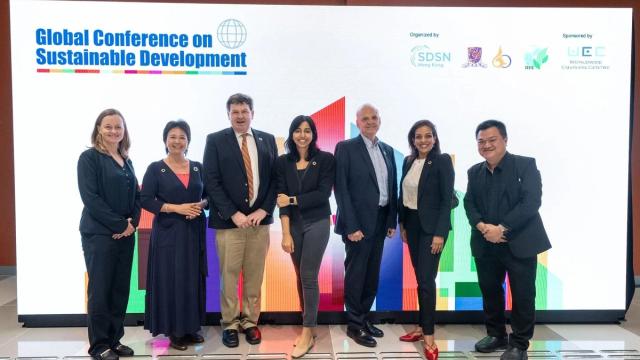ASEAN Green Future, Mission 4.7, and SDG Academy Featured at the Global Conference on Sustainable Development in Hong Kong
Three of SDSNs flagship initiatives – ASEAN Green Future, Mission 4.7, and the SDG Academy – were prominently featured at the Global Conference on Sustainable Development (GCSD), in Hong Kong held on 4 and 5 October 2023 at the Chinese University of Hong Kong (CUHK).
The conference was organized by SDSN’s Hong Kong Chapter and The Institute of Environment, Energy, and Sustainability (IEES) to enable meaningful exchange among academia, philanthropy, civil society, government, and the private sector on the challenges and ways forward in achieving the SDGs. It featured sessions related to key themes including education for sustainable development (ESD), technology and innovation, green financing, the climate crisis, food systems, biodiversity protection, sustainable tourism, health, age-friendly cities, sustainable development governance, and more.
The opening of the Conference saw keynote addresses by The Hon. Tse Chin-wan, Secretary for the Environment and Ecology, Hong Kong; former UN Secretary-General, Ban Ki-moon; and Professor Jeffrey Sachs, President of SDSN. These hopeful messages outlined pathways for sustainable development in a changing world, albeit a world still fraught with many challenges. A common theme was the need for bold solutions to urgently upscale financing sustainable development, especially in developing countries. Professor Sachs shared that as a mature and sophisticated financial center, Hong Kong is well-placed to be the source of innovative approaches for SDG financing, bold policy options, and new sources of funding.
ASEAN Green Future (AGF) and Mission 4.7 were featured in a dedicated panel session on Strengthening Regional Partnerships in Advancing the SDG Agenda. The panel was chaired by Professor Wong Chin Huat, SDSN’s Director of Institutional Design Studies.
Professor Leong Yuen Yoong from SDSN’s Kuala Lumpur Office represented the AGF team and presented the ongoing work on Technology Road Mapping (TRM) and Ecosystem Growth Mapping (EGM). The former involves developing models for possible forward technology options, while the latter emphasizes the recarbonisation of soil, forest, mangroves, corals, and seagrass. As the majority of Southeast Asian countries are still heavily dominated by natural ecosystems, EGM fits very well within this context.
Mission 4.7 was represented by Karen Chand, who shared her team’s analysis that identified three key areas for ESD implementation in the Asia Pacific region: (1) teacher professional development, (2) leveraging trans-disciplinarity in the curriculum, and (3) pursuing whole-of-school approaches. These interventions are especially needed given that learning poverty rates in many developing Asian countries exceed what these countries’ development levels should show. She emphasized the urgency of capacity-building for educators, evidenced by data showing gaps in this area, but also data showing how well-trained teachers can make instrumental impact on the learning outcomes and future prospects of their students. She shared the growing regional partnership that has been newly established among stakeholders in the region, who have committed to working together to turn respective national policies into real impact and, in particular, to jointly deliver localized educator capacity-building programs over the next five years.
The SDG Academy was featured in another dedicated panel session on ESD. It was chaired by Professor Paul Walsh, Director of the SDG Academy, and included Sherlina Kaur, Education Manager of SDG Academy and Professor Charles Hopkins, member of SDG Academy’s High-Level Advisory Council. With education cited as a key enabler of the 2030 Agenda, the panel expounded on SDG Academy’s mission to support the achievement of the SDGs through the creation and delivery of high-quality resources, accredited degree programs, training initiatives, thought leadership, and communities of practice. Sherlina Kaur shared the impressive collection of free SDG online resources covering the extensive component subject matter encompassed within sustainable development.
Professor Hopkins emphasized the importance of higher education institutions (HEIs) and sources of transformative change through ESD, but believes that HEIs themselves have a long way to go to orient their governance, education, research, and outreach towards sustainable development.
Professor Walsh stressed the need for Open Educational Resources (OER), which would involve the adoption of strategies and relevant technologies to ensure OER in any medium are shared openly to maximize equitable access. He believes that a global community of practice must be established to help co-creation, curate, collate, and disseminate high-quality OER for ESD.
For more information on the conference, visit https://www.gcsd2023.sdsn-hk.org
